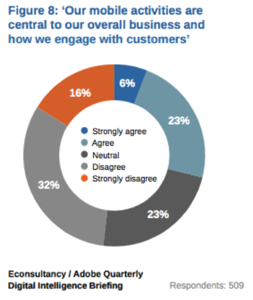Pity the mobile developer.
For years she was told to “build an app for that.” But then questions were raised about whether to focus on Web or native. And now, according to Intercom’s Paul Adams, you shouldn’t be thinking about a mobile-first strategy at all. You should instead be thinking about screens.
Confused much?
Well, it gets worse. Just this week Andreessen Horowitz’s Benedict Evans questioned whether the future is really about apps and mobile at all. Marching to Evans’s beat, mobile platform strategist Peter-Paul Koch piled on, telling mobile Web developers that “it’s time to revisit the Web vs. native debate, and concede defeat.”
What’s a mobile developer to do?
What Does “Mobile” Mean?
First, let’s rethink the term “mobile.” As Evans stresses, “mobile” may be a misnomer.
[M]ost use of “mobile” devices happens at home or at work, or sitting down in a coffee shop—at any rate, not just while you’re walking down the street or queueing at a shop. People use their mobile devices everywhere, and mostly, that actually means when they’re sitting down.
So while we sometimes think that a “mobile experience” should be for that moment when you’re waiting in line, walking through a store, etc., the reality of how we actually use our mobile devices may call for something very different:
[I]ncreasingly [people] spend half an hour burrowing though the Web or into an app, while they’re sitting at home, even with a laptop in reach. So the mobile experience needs to be complete. That might, paradoxically, mean that your total experience might need to be edited, to fit, but it’s dangerous to pick a subset of your offer and put just that on mobile—it might be your only touch point.
In other words, getting mobile right requires real thought, and real strategy. It’s not enough to shrink your website into an app and call it done.
Not only is it critical to get the strategy right, but it’s also important to recognize that an app strategy may not be right for everyone, as I’ve argued. If you can’t imagine a customer putting your app on their home screen, as Evans argues, you need to seriously consider whether you should be building apps at all.
App Or Web?
But wait! It gets worse.
Even as Evans questions the meaning of mobile and the need to build native apps, Koch declares that mobile Web developers have lost, too. That is, lost the Web vs. native battle.
The Web cannot emulate native perfectly, and it never will. Native apps talk directly to the operating system, while Web apps talk to the browser, which talks to the OS. Thus there’s an extra layer Web apps have to pass, and that makes them slightly slower and coarser than native apps. This problem is unsolvable.
While it’s absolutely the case that many apps (including high-profile apps like Instagram) are already hybrid, and that it’s possible to build exceptional, native-like mobile Web apps, Koch argues the collateral damage is significant: “[O]ur desire to take on native heads-on has given rise to unnecessarily complex toolchains that slow down what could be simple websites.”
But an even bigger problem, he argues, is that we may be underselling the Web by trying to turn it into a native app.
We shouldn’t try to compete with native apps in terms set by the native apps. Instead, we should concentrate on the unique Web selling points: its reach, which, more or less by definition, encompasses all native platforms, URLs, which are fantastically useful and don’t work in a native environment, and its hassle-free quality.
All good advice, especially since notifications are taking on more of the workload previously assigned to apps, as Drupal founder Dries Buytaert has argued.
So What To Build?
Where does this leave us? In a morass of confusion.
If you want an easy answer, it’s this: Maybe.
Should you build a native app? Maybe. Should you have a responsive website and/or a rich web app? Maybe. Should you privilege Android’s reach in emerging markets or iOS’s strength with heavy wallets in established markets? Maybe. Should you build for mobile, glanceable moments? Maybe.
Which may not be a satisfying response to those that want a ready-made mobile strategy: “Let’s build an app!” But it’s the right one, given all the complexities inherent in mobile.
Besides, we’ve already learned that the facile “strategies” of mobile’s early years didn’t work. How many companies have built native apps that sit in the app stores collecting one-star ratings?

Most of them. Including yours.
It’s time to stop accepting canned mobile strategies, and instead think deeply about how to make mobile work for a particular brand or enterprise.
This will require that enterprises make mobile not simply a second screen or second-tier priority, as many do (see right).
Once companies really view mobile as central, and accord the strategic planning to mobile that it requires, we’ll start to see highly nuanced mobile strategies. And a lot fewer one-star ratings.
Photo by Cristiano Betta

















